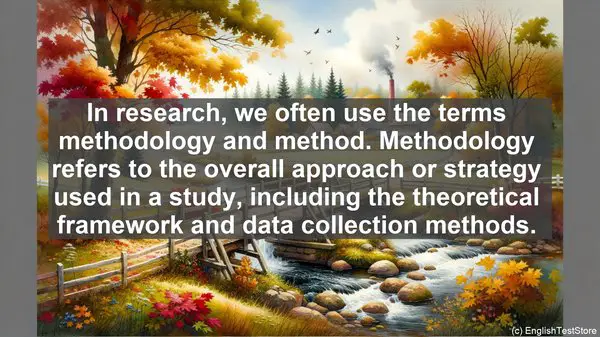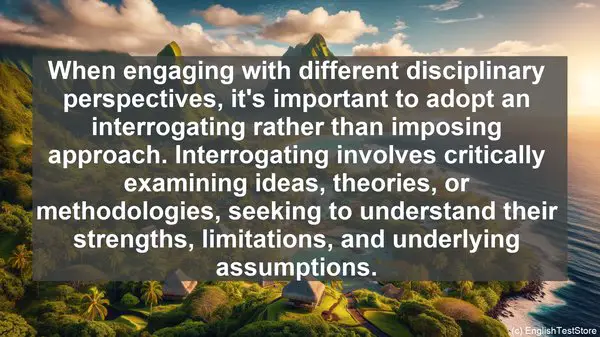Introduction
Welcome to today’s lesson. In interdisciplinary studies, we often come across words that can be confusing. In this lesson, we’ll explore the top 10 commonly confused words and understand their correct usage. So, let’s dive in!
1. Interdisciplinary vs. Multidisciplinary
The terms ‘interdisciplinary’ and ‘multidisciplinary’ are often used interchangeably, but they have distinct meanings. Interdisciplinary refers to the integration of different disciplines, where they interact and influence each other. On the other hand, multidisciplinary involves multiple disciplines working in parallel, but without significant integration. Understanding this distinction is crucial when discussing collaborative research or academic programs.
2. Holistic vs. Reductionist
When examining a complex phenomenon, we can adopt either a holistic or reductionist approach. Holistic means considering the phenomenon as a whole, understanding its interconnected parts and their influence. Reductionist, on the other hand, involves breaking down the phenomenon into smaller, more manageable components for analysis. Both approaches have their merits, but choosing the right one depends on the research question and context.
3. Transdisciplinary vs. Interdisciplinary
While both terms involve collaboration between disciplines, they differ in their scope. Interdisciplinary focuses on integrating knowledge from different disciplines, whereas transdisciplinary goes beyond that. Transdisciplinary aims to create new frameworks and approaches that transcend disciplinary boundaries. It’s about generating novel insights and solutions by combining diverse perspectives.
4. Qualitative vs. Quantitative
In research, we often encounter the terms qualitative and quantitative. Qualitative research involves gathering non-numerical data, such as interviews or observations, to understand phenomena in depth. Quantitative research, on the other hand, relies on numerical data and statistical analysis. Both approaches have their strengths, and the choice depends on the research objectives and the nature of the phenomenon being studied.
5. Epistemology vs. Ontology
Epistemology and ontology are two fundamental concepts in interdisciplinary studies. Epistemology deals with the nature of knowledge and how we come to know things. Ontology, on the other hand, is about the nature of reality and what exists. Understanding these concepts is crucial for developing a robust theoretical framework and conducting rigorous research.
6. Synthesis vs. Analysis
In interdisciplinary studies, we often engage in both synthesis and analysis. Synthesis involves integrating information from different sources or disciplines to create a comprehensive understanding. Analysis, on the other hand, focuses on breaking down complex ideas or data to discern patterns or relationships. Both skills are essential for interdisciplinary research and problem-solving.

7. Paradigm vs. Theory
While related, paradigms and theories are distinct concepts. A paradigm is a broader framework that encompasses theories, methodologies, and assumptions within a discipline. It provides a lens through which we view and interpret phenomena. A theory, on the other hand, is a specific explanation or model that seeks to explain a particular phenomenon. Understanding the distinction between these terms is crucial for navigating disciplinary literature and understanding the underlying assumptions.
8. Methodology vs. Method
In research, we often use the terms methodology and method. Methodology refers to the overall approach or strategy used in a study, including the theoretical framework and data collection methods. Method, on the other hand, refers to the specific techniques or tools employed within the methodology. It’s important to be clear about these terms when designing or evaluating research studies.
9. Bias vs. Perspective
While often used interchangeably, bias and perspective have distinct meanings. Bias refers to a preconceived notion or inclination that may influence one’s judgment or interpretation. Perspective, on the other hand, is a broader term that encompasses an individual’s point of view, shaped by their experiences, values, and background. Recognizing and critically evaluating both bias and perspective is essential for maintaining objectivity in interdisciplinary research.

10. Interrogating vs. Imposing
When engaging with different disciplinary perspectives, it’s important to adopt an interrogating rather than imposing approach. Interrogating involves critically examining ideas, theories, or methodologies, seeking to understand their strengths, limitations, and underlying assumptions. Imposing, on the other hand, means forcing one’s own disciplinary perspective onto others. By adopting an interrogating approach, we foster a more inclusive and collaborative interdisciplinary environment.
